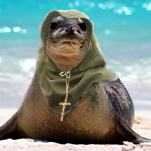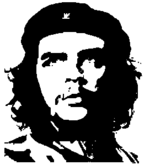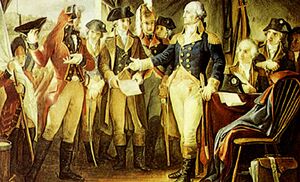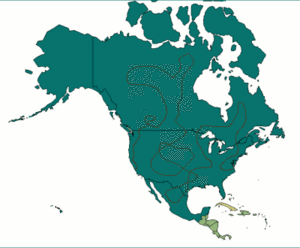American Revolution
| American Revolution | |
|---|---|
Pope Sealdict the CIVILI about to condemn the Brits in 1775 | |
| Causes: Fashion, tea, and corn liquor. (See Declaration of Independence for alternative theories.) | |
| Outcome: Rebels win, Britain jockeys for tactical advantage in next round, America secures rights to continental bossiness. | |
| Combatants | |
| France, Spain, the Dutch, America | Great Britain, Prussia |
| Commanders | |
| Lil Wayne | Sir Plunkett Lilywhite |
| Strengths | |
| 5 farmers, 12 rabbits, France, large number of nations that wanted to see Britain taken down a peg. | More punctual tea times. |
| Casualties | |
| Lives, Fortunes, and sacred Honor | The dialect, the ability to form orderly queues |
“As for me: give me Liberty, or give me Death!”
The American Revolution was a gigantic and violent conflict between England and its colonies in North America, the largest such conflict to-date and not outdone until the emergence of the Beatles.
Pundits debate the needless violence of the Revolution, but it was a key step in the birth of a Nation that would go on to surpass the mother country in so many ways: Dancing with the Stars, Richard Nixon, microwave popcorn, and Monica Lewinsky.
Causes of the conflict

Americans had always lived in peace in America, alongside the Indians, whom they loved and respected despite the overpowering smell of curry in the front office of every motel. However, peace shattered as smelly short men with hideous accents (the same ones that most of the natives had enrolled in Charm School to try to shake) came from over the ocean, formally declaring "WHA' IN THA BLOODY 'ELL IS WRONG WITH YOO?! GAWD! YOO SMELL LIKE BLOODY SOAP!" The arrivals were inches away from declaring war on the Americans, whom they thought too violent to have a country of their own (also too stupid, given how many buttons their computers and microwaves have, which is why the Koreans took over).
Anger grew with the American colonists as well during the '70s, particularly after British soldiers accidentally massacred most of Boston in the mistaken belief that they were the vanguard of a demonic army invading earth from the fourth dimension, when really it was the members of the band Styx and it was no mistake at all.
However, despite the blood in the streets, most Americans oddly resisted the call to war. Some were turning a nice profit dealing with the Mother Country, and some prescient colonials foresaw that independence carried risks to their most prized traditions. What if tea came to be replaced with fizzy soda pop?
Boston Tea Party
The Boston Tea Party, a turning point in the movement toward war, is a huge misnomer. In fact, there are many tea parties every day in Boston, but this particular one was a raid.
England had just lowered the tax on tea, realizing, as no one in modern-day Boston does, that a lower tax might actually get people to pay it. But the King cut his cronies a waiver on the tax, and on December 16, 1773, Bostonians raided British ships in Boston Harbor and threw 342 chests of tea into the drink, resulting in free double portions for anyone who doesn't mind taking his with double salt instead of sugar.
Bostonians being notorious for claiming that, "It wasn't me, it was someone else," schoolchildren today learn that the raiders wore Indian headdress, and slathered themselves in curry powder. In fact, the raiders wore an even more effective disguise: At considerable personal risk, they walked all the way across Boston to the harbor dressed in caps and windbreakers with the logos of the New York Yankees.
The Tea Party had numerous effects that continue to the current day. For one, a so-called Tea Party movement is an assembly of Republicans doing what they do best, forming acronyms (TEA here meaning Taxed Enough, Already). The remaining Republicans have a biennial event on Election Day, each of which tends to be known as the Boston Massacre. Between these routs, Republicans form Committees of Correspondence, as their forebears did, and allow each other to read their manifestos.
Declaration of Independence
Tragically, some of America's leading intellectuals did not just read each other's manifestos but published them for all to see. These included:
- George Washington, originally a chimney sweep from New York
- Benjamin Franklin, restaurant critic and bon vivant
- Thomas Jefferson, eventual co-founder of the rock band Jefferson Airplane
- Thomas "Big Sugar" Paine, the leading pimp of the day, and
- John Freakin' Adams, 'nuff said.
With the backing of the cream of American society, the independence movement began to curdle. Their Declaration of Independence set out America's complete set of grievances against King George, despite his tendency to react badly to overuse of lists. If that weren't provocation enough, the document declared the colonies independent and respectfully invited the redcoats to piss off.
Unfortunately, the Founders' eloquence in describing how Britain should "just go away" was not matched by rhetoric that would actually make them want to do so.
The main problem facing the colonists now was how to achieve their aims against overwhelming odds. The British army was well trained and equipped with the latest weaponry, such as pigs with lasers strapped to their backs, and the British navy stood astride the world like a giant inflatable floating wall with cannons. In stark contrast, the American army in 1770 consisted solely of a man named Cleatus, whose weaponry consisted of an old musket with no trigger and a hamster with a sharpened stick strapped to his back. Obviously, military might alone was not going to succeed in overthrowing the British.
The colonists' plan
Washington suggested dropping the Atomic Bomb on London, but abandoned his idea when reminded that there was no Air Force. Paine was in favour of trying to infect as many of the British soldiers with syphilis as possible, and had to be reminded that syphilis was a slow acting disease. Thomas Jefferson went to his room in a huff, got stoned and ended up writing White Rabbit, which would later become the national anthem. However, it was a stroke of genius from the scientifically minded Franklin that carried the day. His plan was to achieve a literal "revolution": Using a giant lever to revolve America until it faced in the opposite direction. When the British landed in what they thought was the East Coast, they would actually find themselves on the West coast. They would be baffled to find only social workers and surfers, and would have no options beyond going home or marching across the whole continent, during which time the American army might be developed to the point of defeating the worn-out British.
Either way, America would be free to enjoy all the blessings of independence, such as over-eating and driving on the right side of the road.
Delegates from Rhode Island raised the objection that their state would not be flipped along with the rest of the continent, but Franklin assured them that Rhode Island would be attached to the mainland by sturdy ropes, and would thus be towed along as it was revolving. Tecwin Wittock, from Pennsylvania suggested that situating the American populace on the West Coast would risk future conflict with Japan, but he was laughed out of the assembly.
With the plan agreed on, teams of white volunteers and non-white non-volunteers began to heave on the giant lever. At first, as the men strained - nothing. But then, with a creaking, groaning sound comparable to that of an arthritic old man getting his rocks off, America began to move. A huge cheer went up - the American Revolution had begun!
The Revolution begins
When King George of Britain heard the news, he let out a creaking, groaning sound — comparable to the earlier creaking, groaning sound — and immediately ordered the British Army to journey to America.
The ride of Paul Revere
The armory of the ragtag American forces was at Concord, Massachusetts — though access was difficult because William Shatner in Little Women incessantly referred to it as Con Cord. The military intelligence services were even more rudimentary, consisting of Paul Revere, a local software engineer whose "Revere-ware" offered data backup that the Wikia servers could benefit from just now; also Samuel Adams, who even now is known as a "brewer and patriot," and not because he was the only 'smith with a Jones for beer.
The plan for detecting the British invasion was to hole up in a steeple of a church and watch the likely approach routes. A poet named Longfellow played a key role during the long evening in the steeple, but that is a whole 'nother story. Samuel Morse was the lookout, and vowed to transmit his observations using the code for which he would later become famous. To-wit:
- If the British were approaching by land, Morse would hold up one lantern — the Morse Code for the letter E; and
- If the British were approaching by sea, Morse would hold up two lanterns, signifying the letter I, even though Con Cord is nowhere near the coast and tall ships trying to sail up the Con Cord River would disable the defending Americans with gales of laughter.
As the British began assembling their forces on Boston Common, Revere saw the signal from the Old North Church. Adams, brewer and taste-tester, was by then so soused that he could not tell whether or not he was seeing double, and thus could not decode the signal. And being not quite as bright a bulb himself, it was all Revere could manage to decode the first letter of Morse Code, and he stood transfixed as he waited for the signalman to at least finish an entire word, by which time the British forces had assembled. Revere decided that their route did not matter, as his horse would reach Con Cord intact If By Land but not at all If By Sea, so he set off, barely ahead of the British. On the way, he woke up most of the sleeping colonials (which was nothing new) and whipped up their hatred of the British invasion forces (which was also nothing new).
A British cavalry patrol captured Revere, confiscated his horse, and sent him back to Lexington on foot, warning him that he had made enough ruckus for one night. That took some fast talking — though not as much as it would take to become universally known as the hero of that late night — during which time his companion, named Prescott, snuck past and continued the ride to Con Cord, so that when the British got there, they found the Minutemen waiting for them. They boiled a nice lunch of Minute Rice, with some nice Minute Maid to wash it down.
Shot heard 'round the world
That brief repast was held on the Old North Bridge, whose notoriously loose planks may have played a role in what followed. Although Prescott offered his red-coated guests an after-dinner "shot," he knew they had let down their guard and actually intended to serve them a dessert of hot lead. Wikipedia describes the history of this date as "confused and contradictory," but it cannot be denied that the first shot of the Revolutionary War was fired by Prescott, and well before he could remove his revolver from its holster. Prescott forever denied that he grazed his own foot, but news of the gunfire was indeed heard 'round the world, serving to indicate that, while the Americans cooked a "bodacious" turkey dinner, they were hardly marksmen to be reckoned with.
Britain mobilizes
The British Army, led by Sir Plunkett Lilywhite, arrived only a few years later. To their bewilderment, they found themselves not in New York as they intended, but in California. Not sure how to proceed, Lilywhite conducted a brief war against the local surfer tribes. However, after the Battle of Little Bigwave (1782), Lilywhite was informed of what had transpired by a passing surfboard merchant from the east named Benedict Arnold. On hearing that his intended opponents were on the other side of North America, Lilywhite resolved to march his army to the front lines at once.
Things did not go to plan for Lilywhite. Almost half of his men, on hearing of the long march ahead, deserted and took up cannabis farming in a small town that later became San Francisco. The men who stayed loyal endured heat, cold, ice, drizzle, wind, and a general lack of modern amenities. They were forced to eat the pigs with the lasers strapped to their backs, and the lasers did not go down well. Their number rapidly dwindled due to starvation and disease. The remaining men built makeshift rafts and took to the water in the hope that this would speed their journey. Instead they found themselves terrorised by hillbilly partisans, who took potshots from the trees and whose banjo playing struck fear into the hearts of even the bravest man. Lilywhite himself was briefly captured before being rescued by his men.
"Return me my hat, sir!"
Meanwhile, Cornwallis, while hopped up on sugar and caffeine, pulled his shirt over his head and began babbling incoherently. He made his way to Washington's camp at Yorktown, and stole the American general's hat. Eventually, Cornwallis was tracked down and captured. He was brought to Washington's tent, where he eventually surrendered. When Washinton demanded his hat back, Cornwallis refused, and wondered if the Americans were threatening him. Seeing that he was out of his mind, the Americans reluctantly let him go. But they held onto Yorktown.
Revolution ends some time later
The ragged remnants of the British force (Lilywhite, his personal man servant Fred, and 3 soldiers whose names have sadly been lost to posterity) arrived at Yorktown, Virginia in 1783 to face off with George Washington. Faced by the American army, whose weaponry had now been upgraded to a rusty pistol and a dog with a knife strapped to its back, Lilywhite had no choice but to surrender to this overwhelming might. The war was over. Shortly thereafter, France surrendered. Benjamin Franklin's plan had worked. The American Revolution had achieved independence for the colonists. When King George heard the news he was so angry that he ordered the immediate invasion of India, Africa, Australia, and the Falkland Islands. Little did he know that less than 200 years hence the USA would have taken over as the world's bossiest nation and would assume Britain's former mantle of invading other countries.
Revolution II: The British Strike Back
Angered with their defeat at the Death Star, the British sent probe droids to discover the Americans' hidden base on Ice Planet Alaska. Later, it was revealed that George III was actually George Washington's father, after Washington became the apprentice of a swamp muppet and caught a beer with Billy Dee Williams.
So that young schoolchildren don't have to remember all that, this episode is sometimes known as the War of 1812. Critics and pundits have remarked ever since whether the outcome would have been different if they had not started with a later episode and then made "prequels."
See also
| |||||
| Preceded by: Movable type |
Best Thing Ever 1776-1787 |
Succeeded by: The very next war |




